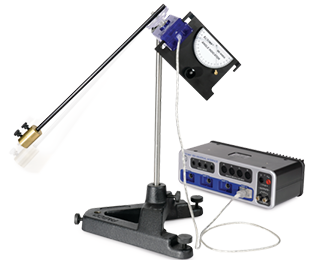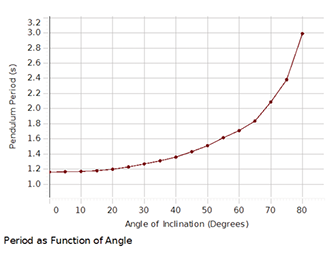Description
This experiment explores the dependence of the period of a simple pendulum on the acceleration due to gravity and on the length and amplitude of the pendulum.
A simple rigid pendulum consists of a 35 cm long lightweight aluminum tube with masses at the end, mounted on a Rotary Motion Sensor. The pendulum is constrained to oscillate in a plane tilted at an angle from the vertical. This effectively reduces the acceleration due to gravity because the restoring force is decreased.
PASCO Advantage: The rigid pendulum can be assumed to be a simple pendulum: the actual period is approximately 99% of the period of a simple pendulum of the same length.
Concepts
- Period of a simple pendulum
- Effect of decreasing “g” on the pendulum period
- Large amplitude period
- Shape of displacement, velocity, and acceleration curves for large amplitude
Experiments
Variable-g Pendulum Experiment
What’s Included
- Large Rod Base (ME-8735)
- 45 cm Stainless Steel Rod (ME-8736)
- Angle Indicator (ME-9495A)
- Adjustable Angle Clamp (ME-8744)
- Pendulum Accessory (ME-8969)
- PASPORT Rotary Motion Sensor (PS-2120A)
Software Required
This product requires PASCO software for data collection and analysis. We recommend the following option(s). For more information on which is right for your classroom, see our Software Comparison: SPARKvue vs. Capstone »
Interface Required
This product requires a PASCO Interface to connect to your computer or device. We recommend the following option(s). For a breakdown of features, capabilities, and additional options, see our Interface Comparison Guide »
Support Documents
Adjustable Angle Rod Clamp Manual
Large Rod Stand Manual


